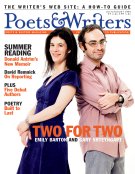Who can resist a good gimmick? When it comes to creative marketing on a tight budget, the editors of literary magazines and small presses are constantly coming up with new tchotchkes to promote their work—and not just the typical lapel pins, stickers, temporary tattoos, and bookmarks. The Gettysburg Review (www.gettysburg.edu/academics/gettysburg_review), the quarterly edited by Peter Stitt, has handed out free travel clocks and calculators at book fairs—no doubt so writers can keep track of the time and money spent submitting their work. The University of Nebraska Press, the distributor of Prairie Schooner (prairieschooner.unl.edu), promoted their new Flyover Fiction series with balsa-wood airplanes—and, as expected, the wings snapped in half almost immediately after assembly. Rebecca Wolff, the publisher of Fence (www.fencemag.com) and Fence Books, has customized wooden rulers with the Fence logo—to measure her magazine against the competition, perhaps? Heck, some folks have even been known to slap a Literary MagNet magnet or two on their fridges. But the promotional product dreamed up by J. D. Schraffenberger, the editor of Harpur Palate (harpurpalate.binghamton.edu), takes the cake. The Spring 2007 "Food, Hunger, and Appetite” issue of his semiannual journal will feature an edible poem written by Cole Swensen. "Though many might construe the edible poem as little more than a marketing gimmick,” Schraffenberger wrote in a letter explaining his plans, "I believe there are important critical questions that will be asked about such an object.” The first being, "What does an edible poem taste like, anyway?” An independent taste test of a sample edible poem, by Thom Ward, reprinted from Volume Five, Issue Two, of Harpur Palate on a two-and-a-half-by-four-inch piece of edible paper using edible ink, yielded the following gustatory comparisons: vanilla, egg whites, communion wafer, edamame pod…and regular paper.
The first rule of performing is knowing when to leave the stage. Put another way: Always leave them wanting more. That old saw can be applied to literature, too, and serial novels in particular. Charles Dickens left the readers of his first novel wanting more—a lot more—for over a year and a half. The Pickwick Papers was released in monthly installments by the British publishing firm Chapman and Hall beginning in March 1836 and ending in October 1837, and it sparked enthusiasm for serialization that lasted through the Victorian era. (Only a thousand copies of the first installment were printed, but the print run for the last installment was forty times that number.) Since then, serial novels have gone the way of the corset, but there are signs of a comeback. The online magazine Slate (www.slate.com) published Walter Kirn’s serial novel The Unbinding in twice-weekly installments from March to June, and Unbridled Books, the independent press in Denver, is publishing a chapter of Marc Estrin’s novel Golem Song on its Web site, www.unbridledbooks.com, each week through October. H. Perry Horton, the editor of Ellipsis (www.waywardcouch.com/ellipsis/currentissue.html), the new monthly literary magazine published in Portland, Oregon, believes the return of the literary serial is key to reinvigorating popular interest in literature. "The trick, as we see it,” he wrote in the January issue, "is to provide readers with a dose of literature requiring a commitment similar to that of a television show or movie, something brief and digestible that still leaves you hungry for more.” (Perhaps Horton and Harpur Palate’s Schraffenberger should team up on a cross-promotional recipe.) In its first few issues, Ellipsis has featured serialized fiction by Steve Almond, Tara Blaine, Laird Hunt, Daniel Wallace, and others. It’s also published a six-part serial poem, an elongated form whose time may—or may not—have come. For slightly less patient readers, Ellipsis also publishes single-serving poetry and prose in each issue.
Kevin Larimer is the senior editor of Poets & Writers Magazine.








